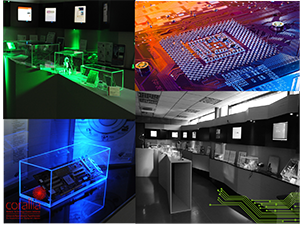The mi-Cluster supporting micro-electronic and embedded systems has created more than 700 highly skilled jobs and attracted more than EUR 30 million in foreign direct investment. The project brings together research, technological development, technology transfer, clusters and business networks.
- 09 December 2015
The project was a large-scale intervention, with the objective to develop a cohesive and productive innovation ecosystem in the micro-electronics and embedded systems sector in Greece and to support a world-class competitive cluster in this field. Of particular importance and a notable successful element of the project, was the smart utilisation of ERDF funds as an incentive to attract venture capital and strategic investors, which resulted in a 269.34 % growth of private investments among the participating SMEs of the cluster.
Mi-Cluster has created a permanent partnership between competitive partners and the research community. The measures that have been implemented have led to cooperation that targets market needs. The cooperation resulted in knowledge and technology transfer as well as innovative ideas that moved from the drawing board to the market.
Considering the financial crisis, the project’s success is even more impressive. Project beneficiaries have on average seen a +145.34 % increase in revenue, +108.45 % increase in exports, +69.7 % increase in employment and +177.27 % increase in patent applications. The project won the Bronze Label for European Cluster Excellence and has been instrumental in establishing the ‘European Semiconductor Cluster Consortium’.
From seed financing to establishing innovation hubs
Combining entrepreneurial and research activities provided tailor-made innovation support. A group involving more than 120 scientific experts helped to assess the technological maturity and entrepreneurial capacity during projects. The ability to attract private investment was also made a prerequisite to receiving public funds.
A policy mix of five separate elements was crucial to mi-Cluster’s success. The first element was the provision of seed financing to projects. Eight projects received financing to develop prototypes to demonstrate new products and attract private investors. The second element was support for research collaboration, in particular, by strengthening industry and research partnerships. The third element focused on private investment in research.
The project had many successes regarding the first three elements. For example, Antcor was acquired by Swiss u-blox, a leading provider of semiconductors and modules for the automotive, industrial and consumer markets. The company subsequently established a design center in Greece creating at least 20 new high value jobs.
The fourth policy element focused on business development and supported many activities, from the participation in trade fairs and exhibitions to professional training in IPR and business management. The final element supported the co-location of businesses through the creation of innovation hubs. The innovation hubs continue to provide a one-stop-shop and bring together innovative start-ups, SMEs, large companies and research expertise.
Total investment and EU funding
Total investment for the project “Aid Measure for the Hellenic Technology Clusters In Microelectronics - Phase 2 (Mi-Cluster Development)” was EUR 46 191 639, of which the EU’s European Regional Development Fund is contributing EUR 25 011 114 from the Operational Programme “Competitiveness and Entrepreneurship” for the 2007 to 2013 programming period.

